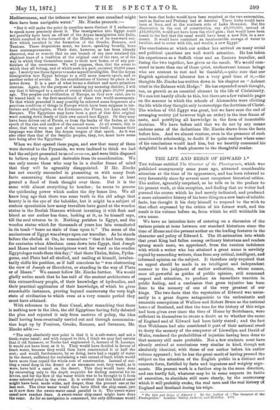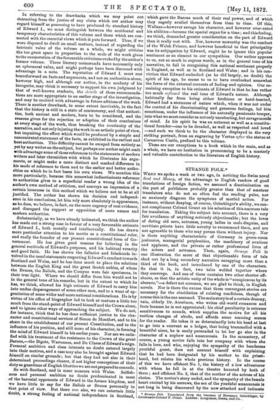THE LIFE AND REIGN OF EDWARD 1.." 1 THE volume entitled
The Greatest of the Plantagenets, which was published anonymously some years ago, attracted considerable attention at the time of its appearance, and has been referred to very favourably sinee by several most competent historical critics. The author, agreeably surprised, as he tells us in the preface to. his present work, at this reception, and finding that no writer had pursued the course which he had merely indicated, and produced a more exhaustive history of his hero-King on a new basis of reliable facts, has thought it his duty himself to respond to the wish to that effect expressed by the critics of his former work, and the result is the volume before us, from which he still withholds his own name.
We have no intention here of entering on a discussion of the various points at issue between our standard historians since -the time of Hume and the present author on the leading features in the character and policy of Edward I. The ill-estimation into which that great King had fallen among ordinary historians and readers sprang much more, we apprehend, from the careless indolence with which a writer who has attained a great name is servilely copied by succeeding writers, than from any critical, intelligent, and informed opinion on the subject. It therefore only required that an appeal should be made in an intelligent and independent- manner to the judgment of earlier authorities, whose names, once all-powerful as guides of public opinion, still command respect and attention, to produce an immediate reaction in public feeling, and a confession that gross injustice has been done to the memory of one of the very greatest of our kings. The two facts that the reputation of Edward -was neces- sarily in a great degree antagonistic to the enthusiastic and romantic conceptions of Wallace and Robert Bruce as the national heroes of Scotland, and that the tone for the history of this reign, had been given ever since the time of Hume by Scotchmen, were sufficient in themselves to create a doubt as to whether the cause of England and of Edward had been fairly stated ; and the fact. that Welshmen had also considered it part of their national creed to decry the memory of the conqueror of Llewellyn and David of Wales, rendered the probabilities of injustice having been done to. that memory still more probable. Not a few students must have already arrived at conclusions very similar in kind, though not absolutely identical, with those of our author before his earlier- volume appeared ; but he has the great merit of having pressed the subject on the attention of the English public in a distinct and concrete form, fortified by facts and ingenious and weighty argu- ments. His present work is a further step in the same direction, and can hardly fail, whatever may be in some respects its faults of execution, to elucidate still more clearly, by the controversy which it will probably evoke, the real man and the Teal history of England and Scotland during his reign.
• The LIfe and Beige of Edward I. By the Author of " Tho Greatest of tine Plantagenets." London: Seeley, Jackson, and Halliday. 1672. In referring to the drawbacks which we may point out detracting from the justice of any claim which our author may regard himself as possessing to have produced the standard history of Edward I., we must distinguish between the accidental and temporary characteristics of this volume and those which are con- nected with the essential views which it puts forward. Thus, if we were disposed to dwell on small matters, instead of regarding the intrinsic value of the volume as a whole, we might criticise the too great space in proportion to the scale of the work given to the enumeration of the favourable criticisms evoked by the author's former volume. These literary memoranda have necessarily only an ephemeral value, and might perhaps have been discussed with advantage in a note. The reputation of Edward I. must rest henceforward on facts and arguments, and not on authorities alone, however high, and although our author, in the modesty of his incognito, may think it necessary to support his own judgment by that of well-known students, the details of these recommenda- tions are more appropriate to an earlier stage of the investigation, and may be omitted with advantage in future editions of the work. There is another drawback, to some extent inevitable, in the fact that the history is still in a state of controversy, and that authori- ties, both ancient and modern, have to be considered, and the reasons given for the rejection or adoption of their conclusions at every stage of the work, thus breaking the continuity of the narrative, and not only injuring the work in an artistic point of view, but impairing the effect which would be produced by a simple and concentrated statement of the facts, as exhibited in the earliest and best authorities. This difficulty cannot be escaped from entirely as yet by any writer on the subject, but perhaps our author might omit with advantage some of those references to the statements of modern writers and later chroniclers with which he illustrates his argu- ments, or might make a more distinct and marked difference in his mode of reference to them and to the earlier and better autho- rities on which he in fact bases his own views. We mention this more particularly, because this somewhat indiscriminate reference to authorities gives to a superficial reader a wrong idea of the author's own method of criticism, and conveys an impression of a certain looseness in this method which we believe not to be at all justified. The author has shown his decision and independ- ence in his conclusions, let him rely more absolutely in appearance, as he does, we believe, in fact, on the mere cogency of real evidence, and disregard the support or opposition of mere names and modern authorities.
Substantially, as we have already intimated, we think the author has made out a strong case in favour of a very favourable estimate of Edward I., both morally and intellectually. He has drawn more particular attention to his merits as a constitutional ruler, and really the founder of our present constitutional form of Go- vernment. He has given good reasons for believing in the general rectitude of Edward's purposes, and his habitual veracity and good faith. He has shown the fallacies and falsehoods in- volved in the usual statements respecting Edward's conduct towards Scotland and Wales, and he has done much to place the relations between the English King and the great Scotch nobles, of whom the Bruces, the Baliols, and the Comyns were fair specimens, in their true light. Where we should differ from him would not be in the general tone of his remarks, but in the extent to which he has, we think, allowed his high estimate of Edward to carry him into undue disparagement of some other men, and to a want of ap- preciation of some wider and more national considerations. He is by virtue of his office of biographer led to look at matters a little too much from the stand-point of Edward himself and the Crown alone, and to ignore other ways of approaching the subject. We do not, for instance, think that he has done sufficient justice to the cha- racter and constitutional services of Simon de Montfort, and to his -share in the establishment of our present Constitution, and to the influence of his position, and still more of his character, in forming the mind of Edward himself in his earlier years. Nor are we satis- fied with his treatment of the resistance to the Crown of the great Barons,—the Bigots, Warrennes, and De Clams of Edward's reign. Personal ambition and class interests no doubt entered largely into their motives, and a case may also be brought against Edward himself on similar grounds ; but that they had not also in their determined proceedings clearer, if not higher conceptions of their duty as guardians of English liberties we are not prepared to concede.
So with Scotland, and in some measure with Wales. Selfish- ness and personal ambition no doubt predominated in most -of the baronial opponents of Edward in the former kingdom, and we have little to say for the Baliols or Bruces personally in that point of view. But there was also, we can entertain little doubt, a strong feeling of national independence in Scotland, which gave the Barons much of their real power, and of which they eagerly availed themselves from time to time. Of this, Wallace—however savage his character, and however over-rated his abilities—became the special organ for a time ; and this feeling, we think, demanded greater consideration on the part of Edward than it really met with. Nor, however unworthy was the conduct of the Welsh Princes, and however beneficial to that principality was its subjugation by Edward, ought he to ignore this popular sentiment as an element in our sympathies. Our author appears to us, not so much in express words, as in the general tone of his narrative, to fail in recognising this national sentiment properly in England, as well as in Scotland and Wales ; and in his con- viction that Edward embodied (as he did largely, no doubt) the spirit of his age, he seems to us to have overlooked somewhat the force of the external currents of feeling and opinion. Our re- maining exception to his estimate of Edward is that he has rather too much softened the real tone of Edward's nature. Although habitually far from being either fer6cious or hard-hearted, Edward had a sternness of nature which, when it was not under the control of his discriminating and generous feelings, led him sometimes, under the influence of his naturally passionate temper, into what we must consider as not only unrelenting, but savage moods of mind. In his spirit he was an autocrat as well as a constitu- tional founder—one to be dreaded, as well as respected and loved —and such we think to be the character displayed in the very striking portrait, from an engraving by Vertue after the statue at Carnarvon Castle, prefixed to this volume.
These are our exceptions to a book which in the main, and as a whole, we have no hesitation in pronouncing to be a masterly and valuable contribution to the literature of English history.



































 Previous page
Previous page